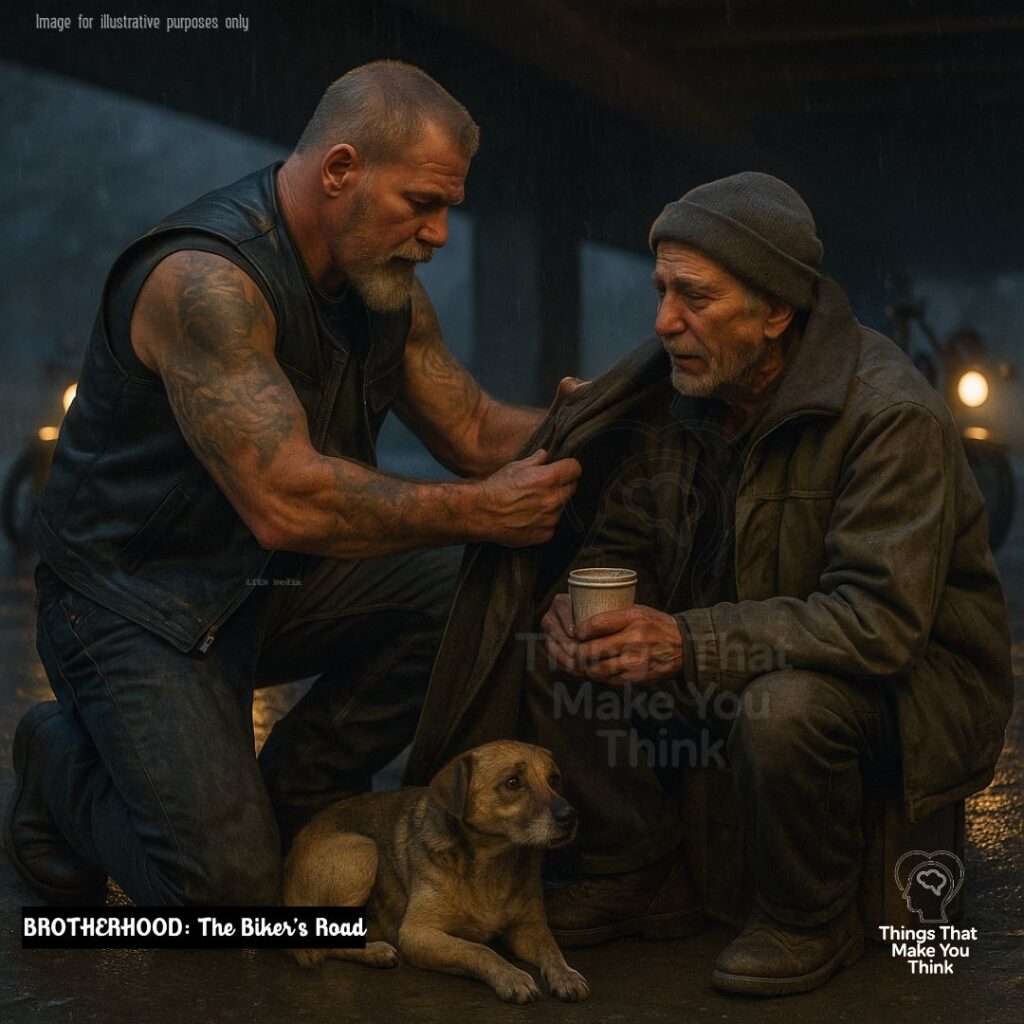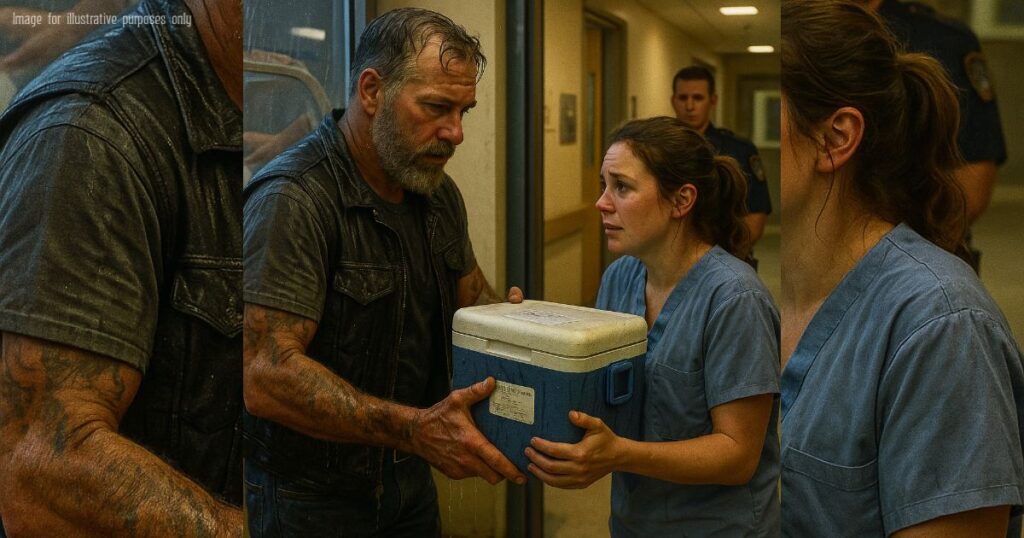“The Weight of a Coat”

Some rescues are loud and fast.
This one was slow, careful, and made of small mercies.
I first saw him under the overpass by Exit 12—the place where wind collects trash and cold. He was sitting on a milk crate, wrapped in a coat too thin for November, boots split at the toes. A cardboard sign rested against his knee:
Army Vet. Anything helps.
A mutt with one ear up and one ear down slept curled against his shins, ribs showing like bad secrets. Traffic hissed above us. The day smelled like wet concrete and diesel.
I killed the engine a block away and walked up with a paper bag. “Got breakfast,” I said, because questions can feel like demands when you’re tired.
He glanced up. Old eyes behind newer pain. “You a cop?”
“No,” I said. I tapped the small patch on my vest. “Just a man who tries to be safe.”
He studied my hands, decided they weren’t trouble, and took the bag. He opened it slow, like he might find a prank inside. When it was only a breakfast sandwich and a hot coffee, his shoulders sank with relief.
“What’s your name?” I asked.
He hesitated, then gave me two: “Roy Bennett. Sergeant. Long time ago.”
“Good to meet you, Sergeant Bennett,” I said. Names matter. Ranks too. “And this?”
He scratched the dog’s head. “Buddy. Keeps me honest.”
Buddy thumped his tail once, then twice.
I sat on the curb. We ate in the quiet that old men earn. After a while he showed me the dog tags he kept in his pocket, chain broken, edges worn smooth by thumb and time. There was a photo too—sun-faded, creased. Him in a uniform next to a woman with a smile that could light a hangar. He slipped it away quick, like memory was contraband.
“How long you been out here?” I asked.
“Since long stopped counting,” he said. “Some days I’m in a room. Some days I’m not.”
He didn’t look at me when he said it. Pride can make eye contact hurt.
“Foot hurts?” I asked, nodding at how he kept shifting.
“Just a scratch,” he lied, and Buddy whined like he didn’t approve.
I texted the chapter: “Need clean socks, size 11 boots, winter coat, dog food. Exit 12.” Then I called Reeves. “Welfare check and a favor. Vet in the wind.”
He didn’t ask for details. “On my way,” he said.
Roy flinched when he saw the cruiser. I raised a hand. “Friend.”
Reeves approached palms-out, voice low. He’s learned the difference between volume and authority. “Sir, I’m Officer Reeves. You good with me standing here a bit?”
Roy stared at Buddy, measuring. “I don’t need no trouble.”
“Me neither,” Reeves said, then set a bottle of water at his feet and backed off half a step.
My brothers rolled up a few minutes later, engines softened, not a single pipe barked. Our noise has scared enough men. We don’t add to it when quiet is medicine. One brother handed over a thick coat and boots. Another laid out socks like offerings. My sister pulled up in the pickup with a plastic tote labeled Winter Kit—wipes, thermals, a knit cap, gloves, a collapsible bowl, and a big bag of dog food.
“Buddy first,” she said, pouring kibble into the bowl. Buddy forgot to be dignified and attacked it like he’d been waiting months for permission.
Roy slipped into the socks like a man remembering warmth. He winced when the boot pressed a swollen spot. That was the tell. “We should get that looked at,” I said.
His jaw clenched. “Hospitals smell like sandbags and bleach.”
“I know,” I said. “We’ll go slow. No loud. You keep Buddy. No one’s taking him.”
He breathed out hard. “Swear?”
“On the road,” I said.
He nodded once. That’s how treaties are made.
We loaded up quiet—no sirens, no lights. Reeves cleared the route, the chapter flanked, and we moved like a small parade that only meant something to the people in it. At urgent care, the nurse at intake saw the coat, the dog, the way Roy stood, and didn’t make him say more than he could. “We’ll keep you together,” she said. “There’s a corner with a chair for Buddy.”
The doc lifted the bandage. Cellulitis, almost to the bone. “We wait, we risk it,” he said. “We treat today, we save the foot.”
Roy’s breath got shallow. I pulled a chair close so he could see my face and not the tray. “In on four,” I said. “Out on six.” He matched me, shaky, then steadier, until the room stopped tilting. They cleaned and wrapped. They started antibiotics. Buddy pressed his head to Roy’s calf like a sandbag against a levee.
Paperwork was the next hill. No ID. No address. No insurance card. The clerk started to say “policy” and my sister slid a card across the counter. She’s been collecting friends for years—the kind that wear lanyards that open doors. “Veterans Service Officer will meet you here,” she said. “He does miracles with clipboards.”
The VSO’s name was Harris, late fifties, mustache that had seen some things. He shook Roy’s hand like he meant it. “We’ll get your DD-214 rebuilt if we have to,” he said. “VA can be a maze. Lucky for you, I like maps.”
Roy snorted. It might’ve been a laugh. Harris got to work. Within an hour, a temporary state ID was in motion. Within two, a bed at a veterans’ shelter was reserved. “Separate space for Buddy,” Harris promised. “They know dogs are sometimes the only reason a man keeps breathing.”
We rode to the shelter at sundown, engines low, wind soft. The porch light was already on. The manager—former Navy, tattoo peeking out from under a polo—offered a hand and a clean towel. Roy stood on the threshold like a man at the edge of a rapids.
“Smells like bleach,” he whispered.
“It also smells like safety,” I said. “Both can be true.”
He nodded and stepped inside. They found a room where a man could close a door and sleep. They filled a bowl. They set a small folded flag on a shelf. “Belonged to the last guy who moved on,” the manager said. “He left it for the next man who needed reminding.”
Roy stared at it a long time. Then he reached into his pocket and pulled out his dog tags. He set them next to the flag. Not giving them up. Just letting them rest.
Before we left, he gripped my wrist. The skin over his knuckles was thin and chapped, but the squeeze was strong. “You didn’t call me ‘homeless’ once,” he said.
I shrugged. “It’s a situation, not a name.”
He blinked hard. Looked at Buddy. Looked back at me. “You ride?” he asked, like he hadn’t been staring at the bikes all day.
“Every mile I can.”
His mouth tilted up. “Maybe when the foot’s good, we make a little noise.”
“We’ll make the right kind,” I said.
A month later, he came by the garage in a thrift-store flannel that fit and boots that didn’t hurt. The infection was gone. The shelter had helped him file claims. Harris found a stipend. A barber took ten years off his face. Buddy had gained weight and lost exactly zero loyalty.
We lifted Roy onto the pillion for a slow loop around the block. He held my shoulders like a man remembering gravity’s other options. When we idled back, tears cut clean tracks through road dust on his cheeks.
“Feels like a coat,” he said.
“What does?” I asked.
“Dignity,” he said. “Heavy enough to know it’s there. Warm enough to keep.”
He reached into his pocket and pressed something into my hand. A faded unit patch, threadbare and stubborn. “For the road,” he said.
I stitched it under my vest later, next to Frank’s old colors and the coin from Reeves. Not where anyone could see—just close enough to ride with me.
“Rescue isn’t a headline. It’s hot coffee, clean socks, a name spoken with respect—
and staying until dignity fits again.”


